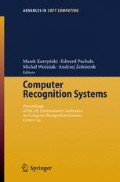Abstract
The paper presents a novel approach to the problem of reliable estimation of the output flow going out from pneumatically controlled ventricular assist device (VAD). Among many possibilities, the application of artificial neural network (ANN) has been decided leading to the promising results. The basic difficulty however is to perform the suitable sufficiently exact measurement on the pneumatic side of the assisting system, which allows to avoid the application of the e.g. ultrasound measuring transducers on the hydraulic side, and which makes possible an implementation of the automatic control algorithm in the future for the whole measurement process. It is important however to underline that from the physical properties point of view these two mentioned sides i.e. pneumatic and hydraulic are completely different. Therefore, due to several nonlinearities, application of ANN gives an acceptable solution.
Access this chapter
Tax calculation will be finalised at checkout
Purchases are for personal use only
Preview
Unable to display preview. Download preview PDF.
References
Czak M, Komorowski D, Kustosz R (1998) An automatic control of the driving unit for pneumatic cardiac assist system. 25th Congress ESAO, November, Bologna
Komorowski D, Tkacz E, Kustosz R (2002) An Application of the Neural Network for Output Flow Estimation in the Pneumatically Driven Polish Ventricular Assist Device (POLVAD). 29th ESAO Congress European Society for Artificial Organs, Viena, Austria, The International Journal of artificial Organs, vol. 20, no. 10.
Ljung J (1987) System Identification: Theory for User. Prentice Hall, Englewood Cliffs, NY.
Ljung L, Soderstrom T (1983) Theory and Practice of Recursive Identification. MIT Press, Cambridge, Massachusetts.
Osowski S (1996) Sieci neuronowe w ujêciu algorytmicznym. WNT Warszawa
Sjoberg J (1993) Regularization issues in neural network models of dynamical systems. Linkoping studies in science and technology. thesis no.386, liu tek lic 1993:08, isbn 91-7871-072-3, issn 0280-7971, Department of Electrical Engineering, Linkoping University, Sweden.
Sjoberg J (1995) Non-Linear System Identification with Neural Networks’. PhD thesis Department of Electrical Engineering, Linkoping University, Sweden
Sontag E (1993) Neural networks for control. In H. Trentelman, and J. Willems, editors, Essays on Control: Perspectives in the Theory and its Applications, volume 14 of Progress in Systems and Control Theory, pages 339–380.
Author information
Authors and Affiliations
Editor information
Editors and Affiliations
Rights and permissions
Copyright information
© 2005 Springer-Verlag Berlin Heidelberg
About this paper
Cite this paper
Komorowski, D., Tkacz, E. (2005). Output Flow Estimation of Pneumatically Controlled Ventricular Assist Device with the help of Artificial Neural Network. In: Kurzyński, M., Puchała, E., Woźniak, M., żołnierek, A. (eds) Computer Recognition Systems. Advances in Soft Computing, vol 30. Springer, Berlin, Heidelberg. https://doi.org/10.1007/3-540-32390-2_66
Download citation
DOI: https://doi.org/10.1007/3-540-32390-2_66
Publisher Name: Springer, Berlin, Heidelberg
Print ISBN: 978-3-540-25054-8
Online ISBN: 978-3-540-32390-7
eBook Packages: EngineeringEngineering (R0)

